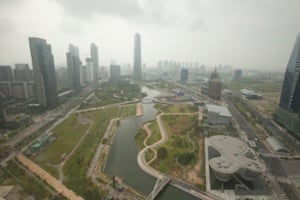As I discussed in my last couple
of posts, urban renewal projects are becoming increasingly prevalent in
Sydney.
The largest urban renewal
project in Australia is currently being constructed in Green Square, close to
Zetland and Waterloo.
Planning
for the project actually started in the 1990s, and it finally commenced
construction in 2008. It is truly a monumental project, with the mixed use precinct
to house an extra 50,000 residents, create 22,000 new jobs and a total site area of
278 hectares.
As
it is an urban renewal project, I want to take an in-depth look at the history
of the site and why it was chosen for urban renewal.

History of Green Square
The
Green Square area has an industrial history dating back to 1815.
The first
industries to appear were grain mills and woolwashing. At the end of the
nineteenth century the industries multiplied and manufacturers such as joiners,
founders and engineers came in.
By 1943, Alexandria contained 550 factories, and was ‘the largest industrial
suburb in Australia’.
However, the downturn in secondary industry from the 1970s ensured a steady decline in demand for industrial factories.
As a
result, the suburbs of Green Square have begun to change.
The new residents of the area
reflect its changing industrial environment.
Although still dominated by
manufacturing, the industries include wholesaling, public administration
and storage.
So Why Green Square?
Green Square is very close to both the City centre and the Airport, lying approximately halfway.
The industrial background of Green Square(as given above) shows that many of these buildings are old and redundant.
The ability to use the prime land to house Sydney's growing population, while at the same time bringing in new and sustainable infrastructure is a perfect scenario.
What will they do?
The project encompasses a number of inner city suburbs, including Beaconsfield, Zetland, Roseberry, Alexandria and Waterloo.
At the heart of the area the NSW Govt, in conjunction with Mirvac, will be the Green Square Town Centre, which will form the residential, retail and cultural hub of the community.
There will be a number of residential and commercial towers that will bring new businesses into the area, as well as house a large residential population.
Sustainability
Most importantly, Green Square will be a trendsetter in green standards. The entire project is being constructed around the concept of 'Green Living', which will utilise recycled water, energy efficiency, green lands and cycling and walking paths.

Thoughts?
Green Square is a magnificent example of the renewal of an old, underutilised area. It will breathe new life into the often-maligned inner city areas of Sydney and will hopefully create a new standard in green living that other new developments will strive to follow.
It is a Public/Private partnership between the NSW State Govt and Mirvac as a developer. While this keeps costs low for the tax payers (as per Barangaroo) there are issues of profitability.
However, the renewal of Sydney's inner suburbs looks like it will be a sustainable, green success.
There was so much information that I used for this, so please have a look through some of these sites and discussions:
http://www.greensq.com.au/home
http://www.smh.com.au/nsw/green-square-traffic-problems-20140726-zu832.html
http://www.be.unsw.edu.au/sites/default/files/upload/pdf/cityfutures/cfupdate/GS_Pilot_Survey_Report_FINAL.pdf
http://sydneyyoursay.com.au/green-square
http://www.cityofsydney.nsw.gov.au/__data/assets/pdf_file/0014/120281/histories-of-Green-Square.pdf
http://www.scottcarver.com.au/cms-next/out-with-the-old-in-with-the-new.phps



